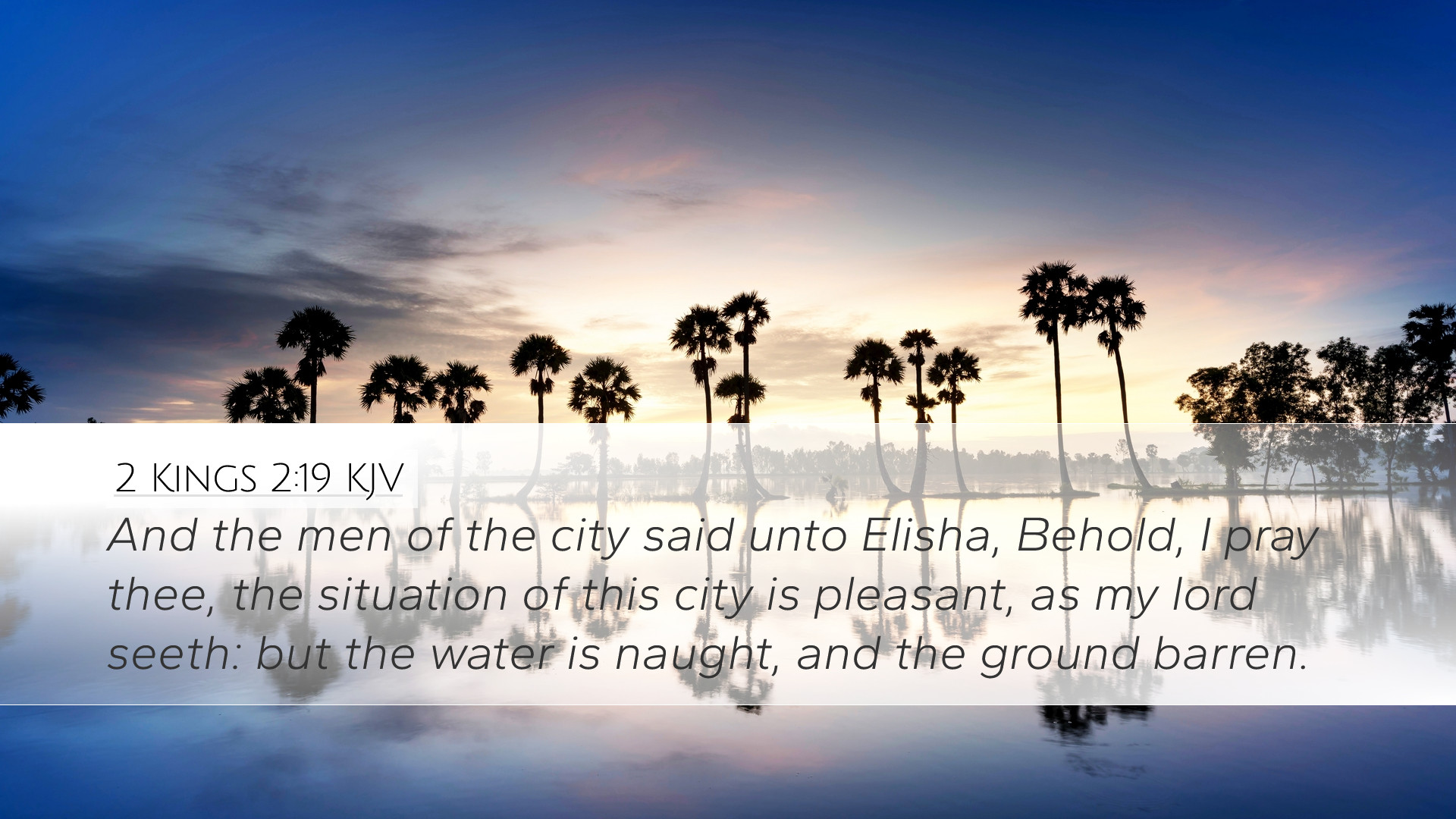Commentary on 2 Kings 2:19
Verse Context: 2 Kings 2:19 states, "And the men of the city said unto Elisha, Behold, I pray thee, the situation of this city is pleasant, as my lord seeth: but the water is naught, and the ground barren."
Introduction
This passage comes in the context of Elisha succeeding Elijah as a prophet in Israel. The men of the city are addressing Elisha, bringing to his attention the dire situation regarding their water supply that affects their land's fertility. This moment initiates a profound turn of events that speaks to the relationship between God's representatives and the needs of the people.
Commentary Insights
1. The Pleasantry of the City
Matthew Henry comments on the description of the city's pleasantness, indicating that while the physical beauty of the locale may attract many, it is a stark contrast to the dire need of its inhabitants. Elisha's recognition of the situation reflects the prophetic role as one sensitive to the needs of the people. The city may have been enviable for its aesthetics, yet it suffered from practical issues that threatened its livelihood.
2. The Role of the Prophet
Both Adam Clarke and Albert Barnes emphasize Elisha's responsive nature as a prophet. The men of the city approached Elisha, demonstrating their belief that he possessed the authority and power to address their struggles. This illustrates a vital aspect of prophetic ministry: engaging with community issues and providing divine solutions. Elisha's subsequent actions provide an exemplary model for contemporary church leaders: being attentive to the physical and spiritual needs of their communities.
3. The Metaphorical Significance of Water
The request to address the bad water carries deeper theological implications. Water in the Bible often symbolizes life, purity, and sustenance. In this context, the "naught" water and barren ground can represent spiritual dryness and a lack of growth. The contrast posed by the pleasant city highlights that external appearances can mislead; without spiritual nourishment, even the most attractive places may be withering underneath.
4. The Power of Divine Intervention
In response to the men’s plea, Elisha's actions—healing the waters—underscore a recurring theme in Biblical narratives: divine intervention in human affairs (Henry). Elisha's faith and reliance on God's guidance to perform miracles reflect a larger truth about seeking God's intervention in seemingly hopeless situations. The prophetic act of bringing healing to their water serves as a reminder of God's concern and capability to redeem challenging circumstances.
5. The Leadership Response
Barnes draws attention to the need for leaders, especially in spiritual contexts, to be fully aware of their community's crises. By portraying the leaders of the city as recognizing and seeking help for their plight, there is an implicit call to humility among leadership. It challenges contemporary leaders to find strength and wisdom not solely in their positions but through reliance on God's empowerment.
Practical Applications
- Awareness of Community Needs: Pastors and leaders must be vigilant and compassionate toward the needs of their communities, echoing the example of the men of the city who approached Elisha.
- Spiritual and Physical Nourishment: The passage invites theological reflection on how to cultivate both spiritual growth and physical wellbeing within the church and community.
- Seek Divine Solutions: Just as Elisha turned to God for guidance in healing the waters, church leaders are encouraged to seek divine intervention in their ministry.
- Emphasize Discernment: The apparent beauty of circumstances should not distract from addressing underlying issues; leaders are tasked with maintaining discernment in their existence.
Conclusion
The events depicted in 2 Kings 2:19 serve as a critical reminder of the urgent need for leaders to engage earnestly with the needs of their communities. Elisha's interactions provide an illuminating example of how prophetic ministry can meet both spiritual and practical dilemmas. As students and scholars reflect on this passage, it is imperative to recognize that God’s solutions to human problems often come through the faithful response of His servants, calling each one of us to be agents of His transformative power.


